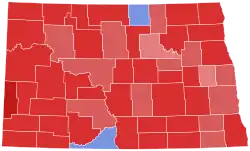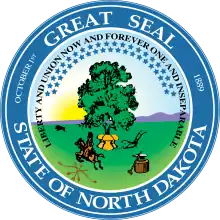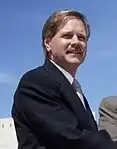2004 North Dakota gubernatorial election
The 2004 North Dakota gubernatorial election took place on 2 November 2004 for the post of Governor of North Dakota. Incumbent Republican Governor John Hoeven was easily re-elected defeating Democratic-NPL former state senator Joe Satrom.
| ||||||||||||||||||||
| ||||||||||||||||||||
 County results Hoeven: 50–60% 60–70% 70–80% 80–90% Satrom: 50–60% | ||||||||||||||||||||
| ||||||||||||||||||||
| Elections in North Dakota |
|---|
 |
Republican nomination
Incumbent Governor John Hoeven was unopposed for the Republican nomination and accepted the nomination by stating that the economy of North Dakota was his priority.[1]
Democratic-NPL nomination
Former state senator Joe Satrom defeated North Dakota House of Representatives minority leader Merle Boucher for the Democratic-NPL nomination. Satrom began campaigning for the nomination almost a year before the North Dakota Democratic-NPL Convention would choose the parties candidate for Governor. Boucher announced his candidacy in December 2003 but struggled to make up ground against Satrom.
The two candidates debated at the University of North Dakota, just before the convention, with education and the future of the state's youth the main topics.[2] The Democratic-NPL Convention voted by 632 to 341 to endorse Satrom as their candidate for Governor.[3]
General election
Campaign
The two candidates met in three debates during the campaign, during the final debate on 9 October 2004 they clashed over a smoking ban, outmigration and a proposed constitutional amendment to ban same-sex marriage.[4]
Satrom called for North Dakota to introduce a one thousand dollar donation limit, for individuals and political action committees, to avoid any perception of conflict of interest.[5] Hoeven named education, growth and jobs as his priorities but faced anger from some hunting groups over changes to hunt seasons.[6]
Opinion polls gave Hoeven a strong lead over Satrom with one in October 2004 showing Hoeven on 70% as against 22% for Satrom.[7] Hoeven raised far more money than his challenger and even a normally Democratic supporting teachers union, the North Dakota Education Association, endorsed Hoeven for Governor.[8] [9]
Predictions
| Source | Ranking | As of |
|---|---|---|
| Sabato's Crystal Ball[10] | Safe R | November 1, 2004 |
Results
| Party | Candidate | Votes | % | ±% | |
|---|---|---|---|---|---|
| Republican | John Hoeven (Incumbent) | 220,803 | 71.26% | +16.23% | |
| Democratic–NPL | Joe Satrom | 84,877 | 27.39% | -17.58% | |
| Libertarian | Roland Riemers | 4,193 | 1.35% | ||
| Majority | 135,926 | 43.87% | +33.81% | ||
| Turnout | 309,873 | ||||
| Republican hold | Swing | ||||
Counties that flipped from Democratic to Republican
- Divide (largest city: Crosby)
- Benson (Largest CDP: Fort Totten)
- Name (Largest city: Stanley)
- Nelson (Largest city: Lakota)
- Ransom (Largest city: Lisbon)
- Richland (largest city: Wahpeton)
- Sargent (Largest city: Gwinner)
- Steele (Largest city: Finley)
- Towner (Largest city: Cando)
- Traill (Largest city: Mayville)
References
- "No Surprise: Hoeven GOP's Man". KXMC-TV. April 3, 2004. Retrieved March 5, 2008.
- "Candidates for governor make stop at UND". Dakota Student. March 30, 2004. Retrieved March 5, 2008.
- "Satrom to Face Hoeven". KXMC-TV. April 4, 2004. Retrieved March 5, 2008.
- "Hoeven, Satrom argue outlet, smoking limits". RiverWatchOnline. October 9, 2004. Archived from the original on February 16, 2008. Retrieved March 5, 2008.
- "Satrom – Campaign Donations". KXMC-TV. October 19, 2004. Retrieved March 5, 2008.
- "A look at the 11 governor jobs up for grabs this year". knoxstudio.com. October 20, 2004. Archived from the original on November 25, 2004. Retrieved March 5, 2008.
- "A new poll says Governor Hoeven has a commanding lead over his Democratic challenger". KXMC-TV. October 23, 2004. Retrieved March 5, 2008.
- "Gov. Hoeven Leads North Dakota Money Race". Fox News Channel. October 21, 2004. Retrieved March 5, 2008.
- "Teachers endorse Hoeven". KXMC-TV. July 13, 2004. Retrieved March 5, 2008.
- "The Final Predictions". Sabato's Crystal Ball. November 2004. Retrieved May 2, 2021.
- "Election Results Portal". Archived from the original on September 27, 2011. Retrieved May 23, 2011.

